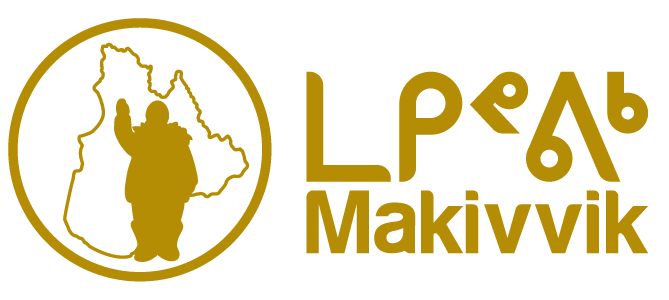
©Makivvik Archives
By Stephen Hendrie
In the mid 1990s Mark T. Gordon was Vice-President of Economic Development for Makivvik. The position fit him like a glove. He was a born entrepreneur, having created his own start-up canteen in Kuujjuaq in his childhood house, which became a popular hangout.
On the occasion of the 20th anniversary of the James Bay and Northern Quebec Agreement (JBNQA) Mark T. – as he was universally known to distinguish him from Mark R. Gordon – granted a lengthy interview to Makivvik News, in his characteristic soft-spoken manner.
He was young at the time of the Northern Quebec Inuit Association (NQIA), and the JBNQA negotiations. In fact, he was in high school in Winnipeg, with Vallee Saunders and Charlie Gordon. He remembers Charlie Watt coming to visit, telling them about the negotiations, advising them both to stay and finish high school.
After graduation, Mark T. started working for NQIA in recreation with Willie Keatainak. He had fond memories of sending the entire Nunavik Sports Team to the Arctic Winter Games in Shefferville on a chartered 727 jet from Kuujjuaq.
“That was probably the first time a 727 jet landed in Kuujjuaq,” he said. He also arranged financial support from the Government of Quebec.
Providing recreation to youth in Kuujjuaq was something Mark T. did previously as a volunteer. His cousin Allen Gordon says Mark T. and others his age were pioneers in the region in terms of recreation.
“They did a lot of fundraising, like bingos, and raised enough money to build a recreation centre for the village, behind the old Co-op. It was our first town hall.” Allen described other exploits, such as organizing the first motorbike races, Canada Day celebrations, snowmobile races to Tasiujaq, and fireworks.
“Mark and Valee Saunders were the first two certified to handle fireworks. They did it for New Year’s Eve in 1980!”
Mark T. later worked with Alec Gordon, of CBC Radio fame in Kuujjuaq, in NQIA communications, recording history being made.
“We worked with state-of-the-art technology at the time, using video equipment, which today is antique,” said Mark T. “We had a lot of fun travelling around recording meetings and witnessing events unfolding towards the James Bay Agreement.”
Fast forward 20 years to his position in 1995 as Makivvik VP in charge of Economic Development. He spoke about the JBNQA as a development tool for the Nunavik region.
“When you talk about economic development, a lot of people try to describe what it is, but there is no single word that stands out which describes economic development. Is it improving your way of life so that things are better? Or is it creating jobs and training? It is a combination of a lot of things.”
He talked about the construction of key infrastructure for the region. New airports were being built, which he described as things taken for granted in the South, but that Inuit had to fight tooth and nail to get.
“The development that has taken place in northern Quebec has not been a result of the government organizations giving it to you because they are good guys. It is because we had to fight for it in a very difficult way.”
At the time he was responsible for the creation of a new Makivvik subsidiary company called Nunavik Arctic Foods. It saw the construction of meat processing plants in four Nunavik communities for caribou, seal, ptarmigan, and Arctic charr. The target was Nunavik and the gourmet market in the South. Years of negotiations with the Crees, Naskapis, and the Governments of Quebec and Canada were needed to amend the JBNQA to allow for the sale of caribou and other meats to non-natives.
Bruno Pilozzi was head of the department at the time and says Mark T. was consumed by the project.
“We would have special events with Chef Jean-Paul Grappe. Mark loved talking about the food, and meeting with people.” Bruno said he had a smile from ear to ear, and he was a consummate entrepreneur. “It was a joy to work for him.”
Mark T. was also fascinated with transportation – it was a key element in developing the region. He spoke at length about the creation of Air Inuit, noting that previous airlines such as Wheeler Airlines, Servair, and Air Gava went out of business.
“We made a decision to get into the business of transportation because it meant so much to us, and we wanted safe reliable transportation.” At the time of the interview, in 1995, Air Inuit employed 250 people. In early 2020 Air Inuit had over 700 employees.
Following his career at Makivvik, Mark T. invested in a family run store in Kuujjuaq called Newviq’vi. Johnny Adams described this as a business challenge. “For sure, especially competing against Northwest Company, as a start-up, and the Co-op. So it was not easy for the original shareholders.” But today it’s a thriving business.
For close to a decade, up until the time of his death, Mark T. was involved in search and rescue, said Johnny Adams.
“He was involved in CASARA, the civil aviation search and rescue association. He helped start it. They were training with Hercules and Twin Otters. He was training coast guard auxiliaries in the communities with his brother Sandy, as volunteers.”
Mark T. Gordon was born April 8, 1953, and died July 20, 2020, in an accident at his camp near Kuujjuaq. He was buried on July 28. The service was held outside under sunny skies, at the grave site, due to COVID-19. He leaves behind family, children, loved ones and a legacy of volunteerism, entrepreneurship, and community service to Nunavik.
*Incorrect information appears in the printed issue of Taqralik magazine. Mark T. Gordon was predeceased by his wife, Eva. We sincerely apologize for the error.






